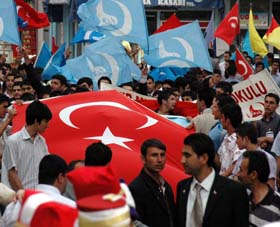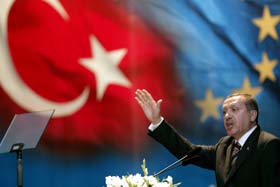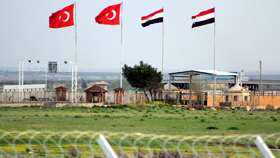The Turkish society is characterized by attempts to connect Islam and nationalism to the ideology of the ruling circles and in collective consciousness, which is inconsistent with the basic concept of Islam, according to which the “national” factor does not play a defining role. However, throughout the period of the existence of the Republic of Turkey, nationalism was the foundation of the ideology of the Turkish Republic. This duality of political consciousness generated, on the one hand, periodic returns to the Pan-Turkism ideology (the idea of unification of all Turkic peoples in a great state called Great Turan), and on the other hand – periodic attempts to return to the “values of Islam”.
The collapse of the Soviet Union resurrected the seemingly forgotten expectations of the Turkish supporters of Pan-Turkism. The press was full of enthusiastic statements about the coming of “the century of the Turks”, while the Turkish authorities began an extensive program of “Turkish unity”. It is these sentiments that seem to have considerably contributed to the “Muslim Renaissance” process: attitude towards adherence to Islam was always with characteristic features of the Turks. As a result, although the hope of implementing a pan-Turkic project did not materialize, both nationalist and Islamist sentiments sharply intensified in Turkey.
The paradox of the situation is that the country’s real economy and real interests ultimately won. First, a capacious Russian market was opened for the Turkish producers through “shuttle trade” (before the August 1998 crisis, Russian “shuttles” would buy goods in Turkey worth, according to Turkish estimates, $8 billion a year. Hundreds of thousands of Russian tourists started visiting Turkish resorts constantly, while Turkish construction companies received prestigious and profitable orders in Russia. On the one hand, this “economic diplomacy” led to the development of mutual understanding between the citizens of both countries, and on the other hand – economic cooperation between Russia and Turkey led to a growth in the Turkish economy and to a strengthening of Turkey’s position as a major power center in the Middle East.
The regional situation contributed significantly to the strengthening of Turkey’s role in the region. After Iraq’s defeat during Operation Desert Storm (1991), Turkey became the largest regional military force in the south. After the collapse of the Soviet Union, real or perceived threat in the north, that has been a source of worry for the Turks for many years, disappeared. Under these conditions, Turkey sought to play a more active role in the new geopolitical environment, while the role of pan-Turkic project decreased.
Let us also note another factor: After the collapse of the Soviet Union, Turkey’s importance as a major NATO outpost in the eastern Mediterranean fell sharply. With the loss of the main geopolitical rival, NATO’s priorities changed in the world and the region, while the United States began building a unipolar world.
Return to Islam
Turkey’s unsuccessful attempts to join the EU (even efforts to make Turkey an “energy hub”, a major energy transportation route for Europe did not help) led to a gradual loss of interest of the Turks in the “European project”. Serious internal political transformation was imposed on external factors in Turkey itself, which experienced growing Islamist sentiments.
Disappointment with allies, with the “European project”, and the growth of anti-Americanism prompted the country to review its foreign policy. This process was especially intensified after the coming to power in 2002 of the Justice and Development Party (AKP) led by Recep Tayyip Erdogan and Abdullah Gul, active supporters of religious revival. They put forward a new philosophical concept of building the country based on a return to the basic values of Islam, while maintaining the nationalist ideology and policy of further Europeanization of the country. Note that this is not the first attempt to write traditional Islamic values in the modernist project. This time, transformation of the Islamic society resonates with the Fethullah Gülen concept, a contemporary Muslim philosopher, scholar and organizer of the largest educational system. It was his influence on the views of Erdogan and Gul that was noted by both Turkish and foreign political analysts. Nursists, Gülen’s followers, established a vast network of high schools and universities around the world, and also created businesses that financially sponsored the activities of the Nursists.
In Turkey, Nursist educational activities led to the formation of a new stratum of intellectuals. Supporters of the sect infiltrated into almost all government structures, including such a bastion of Kemalism, as the Turkish army. Despite the prohibition of the activities of the Nursists (now canceled) and restrictions on the activities of Islamist-oriented structures, supporters of western orientation could not stop the “Islamic revival”. AKP came to power confidently, and has been successfully winning parliamentary elections in recent years, ousting supporters of Kemalism to the opposition.
However, the country’s entire legal system was focused on the containment of Islamists, while the Turkish army has traditionally been considered as the foundation for the conservation of the country’s European and secular orientation. Under these circumstances, the main task of the leaders of the AKP party was to weaken the influence of the army and other security forces in the country’s political life. There were regular military coups and military interventions in the country’s political processes – in 1960, 1970, 1980. The military pursued the rightists and the leftists, banned Islamist parties and tried to limit the influence of Islamists in Turkey’s political life. In military circles, excessive religious zeal of officers was considered as sufficient grounds for retirement.
Based on public sentiment, and in particular, on the continuing desire to join the EU, the AKP party carried out a number of reforms, under the slogan of democratization of the country’s political life, which have long been demanded for by the European Union. Under new laws, the army lost the constitutional instrument of influence on the political life and the right to interfere in internal political struggle. It was only then that the ruling party was able to change the “ideological stakes” and gradually abolish the main ideological doctrine (Kemalism) and proceeded to the Islamization of Turkey’s political life.
From internal Islamization to a change in the foreign policy vector
The process of ideological reorientation of the country’s internal political life pressed hard on bringing the country’s foreign policy in line with a solidifying ideological trend. Hence, Ankara started a search for a new place in global and regional politics. The country improved its relations with Arab countries and intensified links with other Islamic countries. It had to change its relationship with longtime geopolitical rival – Iran. Other foreign policy idea played its role as well: under the slogan “Zero Problems with Neighbors”, there were attempts to stop confrontation with Armenia and to improve relations with Syria. It seemed that such a policy could really help change the political situation in the region.
Adjustment of relations with strategic allies was also required. Alliance with Israel was the first victim of this adjustment. Let’s recall that in January 29, 2009 at a meeting of the World Economic Forum in Davos, there was a famous verbal cross-fire between Prime Minister Recep Erdogan and Israeli President Shimon Peres. Many tried to blame this incident on Erdogan’s emotionality. However, it was much more serious. It was followed by an attempt by the humanitarian convoy Gaza Freedom Flotilla to break the blockade of the Gaza Strip in May 31, 2010 and the death of Turkish activists in the hands of Israeli commandos.
At first glance, for Turkey, all the theatrics of protecting the Palestinian Authority exclusively led to a deterioration of relations with Israel (to the great chagrin of the Turkish generals) and lack of understanding on the part of the United States. However, this is not the case. Turkey has managed to put Israel in a very bad light before Europe, and most importantly, get unprecedented (in scale) support from the Islamic world, especially among the Arabs, who were always wary of the former “center of the empire”. It is extremely important that Israel was forced to ease the blockade of the Palestinian Authority.
In this way, Turkey demonstrated a new foreign policy to its neighbors and to the world. Obviously, this reversal “to the East” was partly as a result of failure to the West, including in the field of European integration, which the AKP party supported with an unprecedented enthusiasm.
Meanwhile, the international political situation dramatically changed. The “Arab revolution” made dramatic adjustments in the seemingly confident course of Turkish foreign policy. Turkish leaders unhesitatingly supported the “Arab revolution”, while Turkey’s reputation has already been established in the eyes of the Arab “street” as the most resolute defender of the Palestinians and which led the Turkish leadership to the forefront of political transformation in the region. Nothing different could be expected from Islamic modernists Erdogan and Gul.
Turkey found itself in a much more complex situation after mass demonstrations swept neighboring Syria. Thousands of refugees began crossing the Turkish-Syrian border, and Turkey had to work out a new policy with respect to both the Syrian authorities and to the assorted factions and oppositions to the Assad regime that emerged on the political landscape of the region. Thus, after several years of building new friendly relations with Syria, Turkish Prime Minister Erdogan completely rebuilt the country’s policy in relation to the Syrian regime.
The ideology emerging in modern Turkey once again played a major role in this “somersault”. In the predominantly Sunni country, Turkey has about 8 to 12 million Alevists, the kindred of Syrian Alawites and Shiite Muslims. Arrogant attitude towards the Alevists and the Shias as pariahs in the Muslim community has always been a characteristic of the majority of the Turkish population, who were confident in the superiority of “their” Islam. In this situation, the news of harassment of Sunni Muslims by some despicable Alawites in a neighboring country raised a wave of “righteous anger” among the Turkish population.
At the same time, the Turkish government sought to consolidate its leading position in the region in the fight against other contenders for the role – the Saudis and Qataris.
Turkey’s wish to restore its position in the eyes of its Western allies as a main outpost for the West in the East Mediterranean played a role.
However, for the Turkish nationalists, especially for the Kemalists and the nationally-oriented center-leftists, this turn of events is extremely risky in terms of preserving the unity of the Turkish state: in addition to the Kurdish problem, Turkey runs the risk of religious strife. Islamism and nationalism again conflicted.
Thus, it seems that all the domestic and foreign policy moves by the current Turkish government were dictated by a change of ideology in the country. This is an extremely painful process for any country and it can lead to the collapse of the entire state system. In the Turkish case, a change from nationalist to Islamist orientation, albeit with a modernist inclination, can lead to the country’s defragmentation under the influence of intractable problems of the new national-state structure. At present, Turkey is in the beginning of this dramatic process, which will inevitably lead to further adjustment in its foreign policy.
Turkey’s foreign policy relations with Russia as part of a “turn towards the East” are already being tested. For example, Russia and Turkey were on different sides of the barricades in the Syrian conflict. However, this did not make the Turks to stop the laying of the South Stream gas pipeline through the Turkish part of the Black Sea shelf. Other joint projects did not suffer as well. However, the expansion and further internationalization of the Syrian domestic conflict as well as a possible strike on Iran will undoubtedly make significant changes in the regional situation and lead to new changes in Turkish foreign policy.







